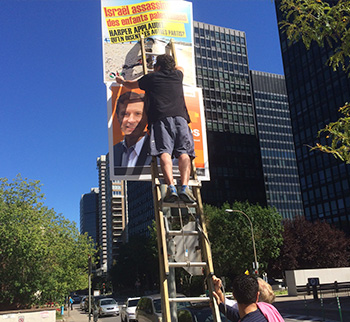The City of Montreal was wrong to remove graphic and inflammatory anti-Israel posters that were put up by a BDS group during last year’s federal election, because that group had lawful third-party status, the Commissioner of Canada Elections has ruled.
Commissioner Yves Côté reminded the municipality that it is an offence “to prevent or impair the transmission of an election advertising message to the public without the consent of a person with the authority to authorize the transmission.”
Montreal does not face a penalty, but it did enter into a compliance agreement with the commissioner in which the city acknowledges its responsibility and commits to ensuring that it will abide by the Canada Elections Act in the future. Such agreements are voluntary, and entering into them is not an admission of guilt that could lead to criminal or civil proceedings.
READ: CONSERVATIVES DECRY GRAPHIC ANTI-ISRAEL POSTERS PLASTERED AROUND MONTREAL
The agreement, dated Dec. 7, was made public on Dec. 15 by the commissioner.
During the campaign leading up to the Oct. 19, 2015 election, Boycott, Désinvestissements et Sanctions Québec posted signs around the city – it claimed about 100 – that read in French: “Israel murders Palestinian children/Harper applauds. What do the other parties say?” There was a photograph of a dead child on them.
In small print were named four Palestinian boys who died on July 2014 while playing soccer allegedly by an Israeli air strike on the port of Gaza.
Côté ruled that two exceptions to this offence, contained in Section 325 of the act, do not apply in this case: that “reasonable notice” is first given to the authorizing person and consent received or the sign is “a hazard to public safety.”
During the campaign the director of public works for the Ville-Marie borough, after receiving complaints from citizens, instructed municipal employees to remove the posters from public property. The borough claimed that it was unaware BDS-Québec was registered with the chief electoral officer as a third party for the election, which entitled it to transmit advertising messages.
After the city was informed of this fact, the Ville-Marie public works director told the employees to stop taking down the posters.
In deciding to draw up a compliance agreement rather than lay a charge, the commissioner said he took into account that the signs were removed in ignorance of the fact they constituted election advertising and that the borough official co-operated with the investigation by “unequivocally admitting his responsibility.”
As part of the agreement, Montreal promised to post on the first page of its website “a clear and visible link” entitled “the City of Montreal enters into a compliance agreement with the Commissioner of Canada Elections” leading to the full text of the compliance agreement, as well as links to it via its Facebook and Twitter accounts.
These publications must be displayed for at least 30 days.
The posters, which began appearing in the third week of September 2015, aroused outrage within the Jewish community and were condemned by the Conservative Party. Both the Centre for Israel and Jewish Affairs and B’nai Brith Canada lodged complaints with Elections Canada on the grounds that the posters propagated false information, a violation of Article 91. B’nai Brith also charged that they were anti-Semitic and inciting.
The Commissioner of Elections Canada, an independent office, ruled at the time that the posters did not violate the Elections Act.
According to information on its website, BDS-Québec is endorsed by 27 groups, including such major unions as the Centrale des syndicats du Québec, the Fédération des femmes du Québec, the student union Association syndicale pour une solidarité étudiante, Independent Jewish Voices, and the political party Québec solidaire, which holds two seats in the National Assembly.
